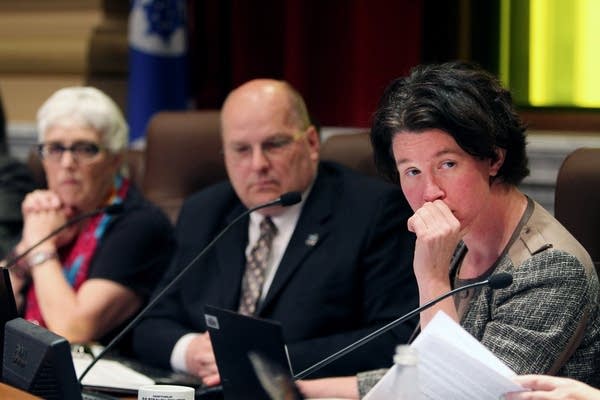Mpls. council proposal aimed at discrimination against subsidized tenants; landlords push back
Go Deeper.
Create an account or log in to save stories.
Like this?
Thanks for liking this story! We have added it to a list of your favorite stories.

Some on the Minneapolis City Council believe landlords are discriminating against certain tenants, and they think a new rule could put a stop to it. The ordinance before a City Council committee Wednesday aims to improve housing options for those getting the federal housing assistance known as Section 8 vouchers.
Vacancy rates in Minneapolis are around 2.5 percent. And some getting Section 8 vouchers to help with rent say finding a landlord who'll rent poses another challenge.
Tracey Clark, 40, works part-time as a mental health specialist at a nonprofit. She's going to college full time, and has her eye on a master's degree. Money is tight.
"I've been hung up on when I ask if people will take Section 8," Clark said.
Turn Up Your Support
MPR News helps you turn down the noise and build shared understanding. Turn up your support for this public resource and keep trusted journalism accessible to all.
Last summer, a new landlord bought the building in the Seward neighborhood where Clark has shared an apartment with her school-age son for the last five years. She pays 30 percent of her income toward rent; Section 8 covers the rest. Clark worried they'd be kicked out if the owner refused to accept her voucher, so she began apartment hunting.
"To be turned down when you may be faced with having to move is really stressful. I prefer not to move just because I know there's a lot of discrimination against people," Clark said, noting she was able to stay after showing her landlord how to receive Section 8 payments.
City Council Member Elizabeth Glidden says Clark's frustrations are common.

"If I go onto Craigslist right now, I can promise you I will find multiple listings that say 'No Section 8.' That's what we hope will change."
Glidden's ordinance would prohibit Minneapolis landlords from posting such ads. The measure — first introduced in 2015 — also requires them to consider voucher holders as they would any other potential tenant. She points out that nearly 60 other jurisdictions nationwide already have such laws, and her proposal does not require property owners to accept Section 8.
But landlords are fighting it. In a full-page Star Tribune ad, the Minnesota Multi Housing Association said the ordinance will lead to "coastal rent prices."
The Hornig Companies owns and manages around 2,000 apartments in Minneapolis, and has some Section 8 tenants. Bernadette Hornig fears Glidden's proposal will mean higher business expenses.

"I just don't think this is the solution to the problem that they're trying to address," Hornig said. "I think it shows a pattern of mandates by the city of Minneapolis that make it really hard as a small business owner to conduct our business on a daily basis."
Property manager Jennifer Spadine agrees. Her company, Guardian Properties, manages about 100 Minneapolis rentals and also accepts Section 8. But Spadine says taking on additional voucher holders will mean more bureaucracy.
"There's inspections, there's delays in the inspections, and delays in the service between us and the program, which causes loss of rent, and causes vacancy."
The Minneapolis Public Housing Authority oversees Section 8 in the city. And the landlords group says MPHA is unable to handle any additional regulations. A 2016 study commissioned by the nonprofit Family Housing Fund recommended streamlining the inspection process for rentals and allowing quicker payments to building owners. The Housing Fund says without significant administrative changes at MPHA, the nondiscrimination ordinance won't help low-income renters find apartments.

Greg Russ, the Housing Authority's new executive director, said he's open to ideas for improvement. Russ said Glidden's ordinance may help renters in their search process. But it won't create more work for his staff, nor will it mean big changes for property owners.
"You still have a right as a landlord to screen, and the ordinance itself also includes hardship provisions. If a landlord feels like this is something I can't accomplish, there's a process to go to the city and declare that," Russ said.
MPHA can't add new Section 8 tenants without more federal funding. In Minneapolis more than 1,700 families are on the waiting list. No one has been added to the list in nine years.
The full City Council could hear the ordinance proposal on Friday.


